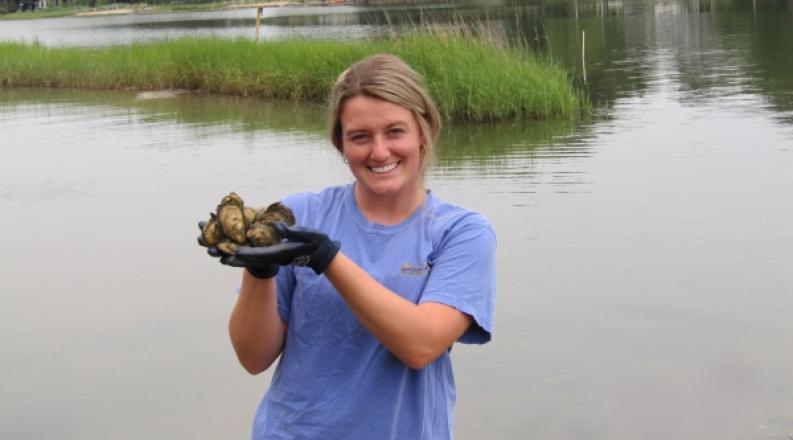Sierra Hildebrandt, a Ph.D. student at Old Dominion University's Department of Biological Sciences is one of the recipients of the Virginia Sea Grant 2022 Graduate Research Fellows. Hildebrandt is one of only seven recipients from across the Commonwealth for this year's competitive research award. Virginia Sea Grant will fund Hildebrandt for two years beginning in the fall 2022. As part of her fellowship, she will create a database of living shoreline projects in Virginia and evaluate living shoreline performance over time and as a Hampton Roads native, this is a dream come true.
"I grew up in Hampton on a small tributary of the Chesapeake Bay and that is where I developed this desire to understand our coastal ecosystems," said Hildebrandt. "But living in the same place has allowed me to see just how interconnected and changing our systems, and I think that is fascinating."
Hildebrandt began as an ODU undergraduate and her fascination for coastal ecosystems grew after receiving a B.S. in Biology with a concentration in marine science in 2018. Then she received a M.S. from Hampton University in Biology where her research focused on alternative oyster restoration techniques. "I made a lot of great connections with the nonprofits and businesses in the area as a result," said Hildebrandt.
Her timing was impeccable when she was looking at a school to pursue a Ph.D. "I knew I wanted to stay in the area and continue to build my network and make new connections," said Hildebrandt. "However, I also knew I wanted to continue with oyster research and expand my areas of interest a little broader into coastal and wetland systems." The decision to stay ultimately led her to ODU's new Assistant Professor, Taylor Sloey, Ph.D., a wetland biologist. "I happen to come across Dr. Sloey's Twitter's page once she became a new hire and I reached out to her." The two met via Zoom and Hildebrandt was immediately excited about working with Sloey as a doctoral student. What sealed the deal for her start in 2021 was how interested Sloey was about helping Sierra pursue her own research interests in wetlands. "I liked that Dr. Sloey was so open to me continuing my oyster work while incorporating more coastal and wetland plant work," said Hildebrandt. "Working with Dr. Sloey will put me where I want to be five years from now and I think that is important coming into a Ph.D. program."
Assistant Professor Sloey works directly with Hildebrandt. "Since Sierra joined the PhD program at ODU in 2021, she has hit the ground running working with Virginia's living shorelines. She's deeply involved with local living shoreline stakeholders and frequently volunteers at restoration projects around Hampton Roads. The opportunity for her to join the 2022 VA Sea Grant Graduate Research Fellowship class is well deserved and will certainly propel her to become a champion of our coastlines for years to come."
Already one year into ODU's Biological Sciences Ph.D. program Hildebrandt is making waves and received the coveted 2022 Virginia Sea Grant Graduate Research Fellowship. The Virginia Sea Grant will be funding Hildebrandt for two years beginning fall 2022 through spring 2024. There are two portions of this fellowship which are research and outreach.
"For my research, I will be focusing on living shorelines which are a type of nature-based approach for shoreline protection," said Hildebrandt. Living shorelines are an alternative approach to traditional shoreline armoring such as sea walls or bulkheads and incorporate natural features such as marsh plants and oysters that mimic protective services of natural ecosystems while maintain provision of ecosystem services including shoreline stabilization (reduce erosion), improve water quality, etc. "In Virginia, policies have been implemented to promote use of living shorelines, but widespread use has been limited by the lack of long-term data, so during my research as a VASG Graduate Research Fellow will aim to evaluate living shoreline performance over time and identify areas for living shoreline prioritization within historically underserved communities," said Hildebrandt.
The Sea Grant award also has an outreach component and Hildebrandt will collaborate with a professional mentor at Wetlands Watch to create outreach materials related to living shorelines and her research. Wetlands Watch is a nonprofit in Norfolk, Virginia that works to protect wetlands through state and federal advocacy, education, and local activism.
"We're excited to welcome an extremely diverse group of Graduate Research Fellows into the VASG student and professional cohort," said Troy Hartley, director of Virginia Sea Grant. "Their unique lived experiences, perspectives, and interests will drive innovation that is critical to address coastal issues in Virginia. We look forward to supporting their professional growth for years to come."
"I am fascinated by everything in Biology/Ecology," said Hildebrandt. "I think that is why I am on this career path because I have never stopped asking questions." Every time she learns something new, she has additional questions that she needs answered.
Coming into ODU's Ph.D., program means committing five years, and Hildebrandt has planned to dedicate her time to finishing what she started. "I have really enjoyed my time so far as a graduate student at ODU. While I do not know all the faculty, the ones I do interact with are very genuine and care about the students at ODU. They want us to be well-rounded scientists at the end of the day and achieve our goals."
Getting to do research along Virginia coastal lines still fascinates Hildebrandt as well. "As far as research, well you can't pick a better location than the Chesapeake Bay and its tributaries for research," said Hildebrandt. "I get to do what I love in the area that has already given me so much with the hopes of improving our shorelines and waterways for a better future."



